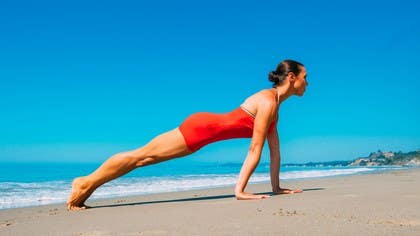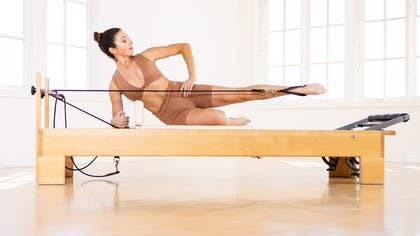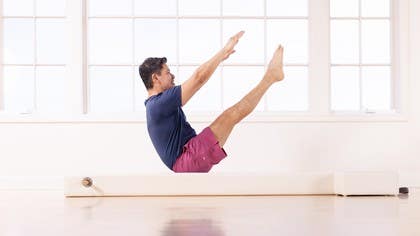
9 Reasons Why Men Should Do Pilates
Men often shy away from Pilates because it seems like a female-dominated practice. But in reality, many professional athletes use it as a form of cross-training to improve their overall performance. Not a pro football or basketball player? Pilates can still be a vital component to your exercise routine and serve as a fountain of youth for your overall physical well-being.
- Balance the body: Pilates works both sides the same way. This draws attention to any of your imbalances. If you favor one side of your body over the other, if an arm, leg, or group of abdominal muscles is weaker, Pilates will demonstrate the difference. It will allow you to strengthen your weaker side.
- Improve posture: If you haven't been giving your posture enough love because you sit at a desk all day, drive in a car endlessly, or just don't know how, Pilates will mother your posture into alignment. Pilates corrects poor posture by strengthening the muscles that "lift" you up. Good posture is not just for your appearance – it's also for your health! Proper posture reduces the wear and tear on your spine and improves your balance, which, can decrease in quality as you age. If balance degrades, you're more prone to injury by tripping and/or falling.
- Become stronger – in places you didn't even know you could get strong: If you have an exercise routine, you probably work the same muscles all the time (and to be fair, that's probably your goal). Pilates gets to the teeny-tiny stabilizers and otherwise neglected muscles that you didn't even realize needed attention, which in turn support your larger muscles.
- Breathe better: Pilates focuses on diaphragmic breathing, which oxygenates your muscles (and your entire body) so that they can perform better. Plus, deep, quality breath helps your heart with blood circulation, reduce stress, and increases overall mental clarity. Proper breathing even helps with injuries: Practicing Pilates breathing techniques while performing any exercises will help prevent injury. In a study, Pilates breathing during trunk exercises was proven to reduce and prevent injury in comparison to the same exercises performed without focus on breath.
- Prevent injuries: Three of the main principles of Pilates are precision, centering, and control. Making these the basis of any physical activity allows your muscles to be more stable, in better form, and enables you to have more control over your movements. One of the most common causes of injury is improper form. With Pilates, you are literally balancing your body and zeroing in on properly aligned skeletal and muscular structure. This will carry proper alignment through everything else you do.
- Recover from injuries: Since Pilates can be tailored to any level and for any injury, it makes a beautiful addition to a physical therapy program. The thought of minimal activity during injury recovery drives anyone used to being active bananas!
- Reduces back pain: Pilates has proven to be just as effective as, if not more than, massage therapy for alleviating lower back pain – which seems to affect pretty much all of us (male and female) as we age!
- Increase your range of motion: Pilates' focus on flexibility and lengthening will increase your range of motion, making everyday movements (like reaching up high to get something from the top shelf) and physically related movements significantly smoother and easier.
- Improve your sex life: Yeah, we went there. (Perhaps we should have started with that?) With all the physical benefits and improved breathing techniques, you'll have better stamina – not to mention a stronger core and pelvic floor, making the intimate experience more enjoyable for both parties.
How is Pilates different from yoga and other Mat classes?
Many people will group Mat Pilates and yoga in the same category, since they're both (usually) done barefoot, on a Mat, in a studio, and have a general focus on lengthening and breathing. But, the similarities pretty much end there!
While yoga is more about flexibility and strength from the root upward (base of the feet to the sky) with a focus of unionizing body, mind, and soul, Pilates focuses predominantly on anatomical and physical function, with all exercises radiating from the core, in an effort to unify the breath with the body to optimize length, strength, and function. A lot of people who don't love the "woo-woo" or "spiritual" aspects of a yoga class will prefer Pilates since Pilates is purely functional and instructional – traditional Pilates classes won't even play music. The focus on form and function in a Pilates class is a way into mind/body/spirit for many students.
How can I start a Pilates practice as a beginner?
Since men tend to be a little less flexible than women (even if they are already very physically active), we recommend either visiting a Pilates studio for a beginner's class or semi-private, where the teacher will be able to focus and adjust you directly. Another option is to begin practicing at home with videos specifically created for men, such as this Men's Pilates series.
How can I start a Pilates practice if I'm already pretty active?
If you're already pretty active, feel free to visit any studio and just give the teacher a head's up that you're new to Pilates, so that the teacher is aware that you may not know the exact meaning of all the cues. With that being said, if you'd like to familiarize yourself with the most common Pilates cues, you can check out this video. If you're starting a home practice, we recommend Pilates videos catered specifically toward men prior to diving into regular Mat Pilates videos.
Comments
No comments yet. Be the first!












You need to be a subscriber to post a comment.
Please Log In or Create an Account to start your free trial.